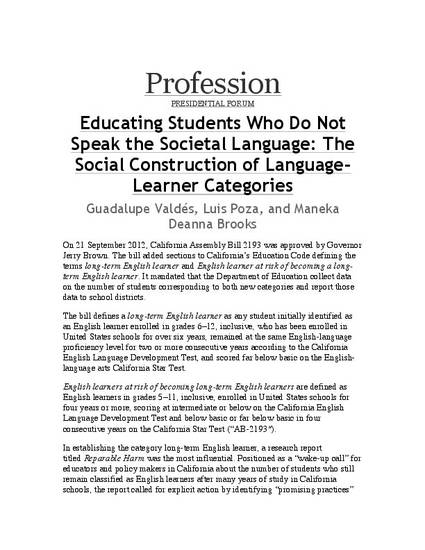
Article
Educating Students Who Do Not Speak the Societal Language: The Social Construction of Language-Learner Categories
Profession
(2014)
Abstract
On 21 September 2012, California Assembly Bill 2193 was approved by Governor Jerry Brown. The bill added sections to California’s Education Code defining the terms long-term English learner and English learner at risk of becoming a long-term English learner. It mandated that the Department of Education collect data on the number of students corresponding to both new categories and report those data to school districts.
This specific example of the construction of categories and labels matters because it is a clear example of how coexisting discourses and language ideologies provide a set of cultural rules, conditions, practices, and power relations (Chilton; Goodwin and Duranti; Lindstrom; Van Dijk, “Contextual Knowledge Management” and “Discourse”) that lead to the uncritical acceptance and reification of those categories. More important for this essay, it calls attention to the politics of language in educational contexts in this particularly vulnerable period of time in which economic, political, educational, and theoretical shifts intersect with mass migratory flows.
Disciplines
Publication Date
2014
Publisher Statement
This article was published in Profession, 2014, and can also be found online at this link.
This work is licensed under a Creative Commons Attribution 4.0 International License.
Citation Information
Guadalupe Valdés, Luis E. Poza and Maneka Deanna Brooks. "Educating Students Who Do Not Speak the Societal Language: The Social Construction of Language-Learner Categories" Profession (2014) ISSN: 0740-6959 Available at: http://works.bepress.com/luis_poza/13/
Creative Commons license

This work is licensed under a Creative Commons CC_BY International License.
